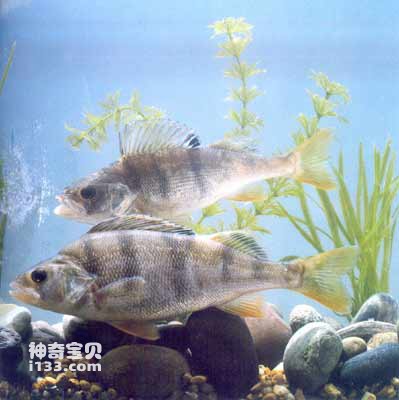Perca (Perca fluviatilis) belongs to the order Perciformes, family Perciidae, and genus Perca. Commonly known as: five blacks. English name: River perch, Perch, Ereshwater perch.
The sides of the body are flat, oblong, and the tail stalk is thin. The head is small, the snout is blunt, and the mouth is pointed. The lower jaw is slightly longer than the upper jaw, and the rear end of the maxilla reaches below the eye. There are fine teeth on both the upper and lower jaws and the oral cavity. There are many small serrations on the posterior edge of the anterior operculum, and there is 1 spine on the posterior edge of the posterior operculum. The two dorsal fins are slightly separated. The first dorsal fin has 8-16 hard spines, of which the 4th is the longest; the second dorsal fin has 3 hard spines and 13 soft rays, with the 1st and 2nd fins being the longest. The pectoral fin is positioned laterally and lower, the pelvic fin is positioned on the chest, the caudal fin is shallowly forked, and the ends of the two leaves are rounded. The body is tan, with 7-9 black horizontal spots, and the abdomen is white; the dorsal fin is light gray-yellow, with a large black spot on the back of the first dorsal fin; the pectoral fin is light yellow; the anal fin, pelvic fin and caudal fin are orange.

Perch lives in rivers and lakes with thick vegetation. There are usually two groups: one group lives in shallow coastal waters, feeds on invertebrates, is smaller and grows slower; the other group lives in deep waters, feeds on small fish, is larger and grows slower. Faster. The larvae feed on zooplankton. When the body length is 40 mm, they feed on small fish and sometimes aquatic insects and crustaceans. Perch feeds more actively in summer than in winter, and usually stops feeding during spawning. The broodstock that begin to mature are 5 years old in winter. After thawing in early spring, when the water temperature reaches 7-8°C, they will breed in a place with stable water potential.
Perch is widely distributed in the cold temperate zones of Europe and northern Asia. In my country, it is only found in the Irtysh River and Ulungu River basins in Xinjiang. It is a very important fishing target in Russia. The natural output of northern Xinjiang in my country is very large. This fish has plump flesh and is one of the most famous local edible fishes.
animal tags:
We created this article in conjunction with AI technology, then made sure it was fact-checked and edited by a Animals Top editor.